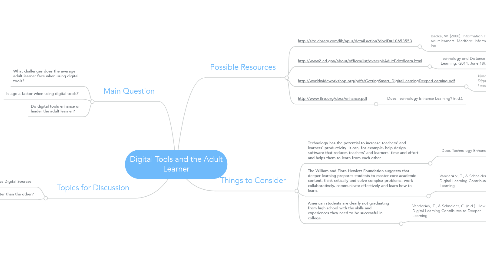Digital Tools and the Adult Learner
by Lori Miller


1. Main Question
1.1. What challenges does the average adult learner face when using digital tools?
1.2. Is age a factor when using digital tools?
1.3. Do digital tools enhance or hinder the adult learner?
2. Topics for Discussion
2.1. Traditional vs Digital Sources
2.1.1. Company 2 (Location)
2.1.2. Job Title
2.1.3. Responsibilities
2.2. Is one better than the other?
2.2.1. Company 1 (Location)
2.2.2. Job Title
2.2.3. Responsibilities
3. Possible Resources
3.1. http://site.ebrary.com/lib/apus/detail.action?docID=10653553
3.1.1. Badke, W. (2008). Information literacy meets adult learners. Medford: Information Today, Inc.
3.2. http://www2.ed.gov/about/offices/list/ovae/pi/AdultEd/tdlearn.html
3.2.1. Technology and Distance Learning. (2014, June 18).
3.2.1.1. HTML
3.2.1.2. CSS
3.2.1.3. Javascipt
3.3. http://worldwideworkshop.org/pdfs/GettingSmart_DigitalLearningDeeperLearning.pdf
3.3.1. VanderArk, T., & Schneider, C. (n.d.). How Digital Learning Contributes to Deeper Learning.
3.4. http://www.tlrp.org/docs/enhance.pdf
3.4.1. Does Technology Enhance Learning? (n.d.).
4. Things to Consider
4.1. Technology has the potential to increase teachers’ and learners’ productivity. It can, for example, help design software that reduces teachers’ and learners’ time and effort, and helps them to learn from each other.
4.1.1. Does Technology Enhance Learning? (n.d.).
4.2. The William and Flora Hewlett Foundation suggests that deeper learning prepares students to master core academic content, think critically and solve complex problems, work collaboratively, communicate effectively and learn how to learn.
4.2.1. VanderArk, T., & Schneider, C. (n.d.). How Digital Learning Contributes to Deeper Learning.
4.3. American students are clearly not graduating from high school with the skills and experiences they need to be successful in college.
4.3.1. VanderArk, T., & Schneider, C. (n.d.). How Digital Learning Contributes to Deeper Learning.
